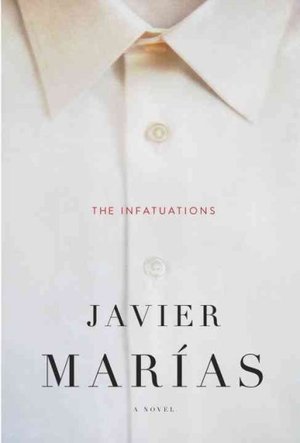Is adultery a kind of murder that causes ex-spouses and old lovers to be expunged from our lives, as if they’d never existed? Are novelists akin to rogue detectives or perhaps morticians, possessed with godlike powers: creating make-believe people, killing them off, then exhuming their corpses for clues about their character?
These unsettling thoughts may creep up on you as you read “The Infatuations,” the precise, haunting new novel by Spanish author Javier Marias.
Asymmetrical love affairs, sudden (often violent) death, the wobbly nature of identity and the curious link between the fictions we read (or write) and the shaky narratives we fabricate from our own lives are the recurrent fixations of this witty, urbane and acutely perceptive writer. Superficially, “The Infatuations” is a romantic fable inside a crime story, focused on a thirtysomething Madrid single, Maria, who may be a namesake for the author. (Or is it, with a nod to Borges and Cervantes, the other way around?)
For reasons she herself never wholly fathoms, Maria becomes obsessed with a seemingly blissful wife and husband, Luisa and Miguel. Initially, she knows them only as the mysterious Perfect Couple — affluent, attractive, manifestly in love — who breakfast every morning at her favorite cafe.
But Maria, who works in book publishing and possesses an exceptionally active imagination, embroiders elaborate mental fictions about Luisa and Miguel. (She reads people like books, almost literally.) The couple, in turn, is making playful conjectures about Maria, whom they’d dubbed the Prudent Young Woman.
Yet the novel’s strategy is to reveal these roiling thoughts for what they mostly are: stories we invent to snatch at what Melville called “the ungraspable phantom of life.” Through interlacing internal monologues, the novel switches seamlessly between the minimal action that occurs, which may or may not jibe with its characters’ fantasies, projections and rationalizations about what occurs.
“When someone tells us something, it always seems like a fiction, because we don’t know the story at first hand and can’t be sure it happened,” goes one such musing of Maria’s. “… It forms part of the hazy universe of narratives, with their blind spots and contradictions and obscurities and mistakes.”
Maria’s psychological stalking takes a shocking turn when Miguel is brutally murdered. In the tragedy’s aftermath, Maria and Luisa become acquainted and Maria is introduced to a character previously hovering in the shadows of Miguel and Luisa’s: Miguel’s best friend, Javier Diaz-Varela, described in Maria’s shrewdly ironic first-person voice as “a very calm fellow … virile and handsome” with “a hint of beard, a slight bluish shadow … like that of a comic-book hero.”
As Maria’s involvement with Javier deepens, Marias draws his readers into a labyrinth of tenuous beliefs and tantalizing speculations, threaded with resonant literary allusions (“Macbeth,” “The Three Musketeers,” Balzac’s “Le Colonel Chabert”). Dialogue and plot frequently pause for paragraphs, even pages, to make way for the characters’ inner soliloquies. These digressions, despite their occasional longueurs, are an essential component of Marias’ self-consciously literary sensibility.
But Marias also undercuts the idea that literature can serve as a conduit to enlightenment rather than as merely another veil of uncertainty. One of the novel’s secondary characters is a pompous author, so vain that he has already written out his Nobel Prize acceptance speech — in Swedish.
Masquerading as melodrama, “The Infatuations” gradually unmasks itself as a philosophical crime-scene investigation, in which Marias’ scalpel-like prose and microscopic observations lay bare the fragmented nature of our most intimate relationships and of everything we think we know about why we behave as we do.
All is contingency in Marias’ cool, clear-eyed worldview. By savoring obscure motives and absurd turns of fate, he dispels facile explanations of why people commit extreme acts of love, anger, mercy, betrayal. His slippery prose keeps his readers struggling for mental traction.
Yet his style is uniquely his own, as are the discoveries he makes while rummaging around in the basement of the human heart.
Send questions/comments to the editors.



Success. Please wait for the page to reload. If the page does not reload within 5 seconds, please refresh the page.
Enter your email and password to access comments.
Hi, to comment on stories you must . This profile is in addition to your subscription and website login.
Already have a commenting profile? .
Invalid username/password.
Please check your email to confirm and complete your registration.
Only subscribers are eligible to post comments. Please subscribe or login first for digital access. Here’s why.
Use the form below to reset your password. When you've submitted your account email, we will send an email with a reset code.